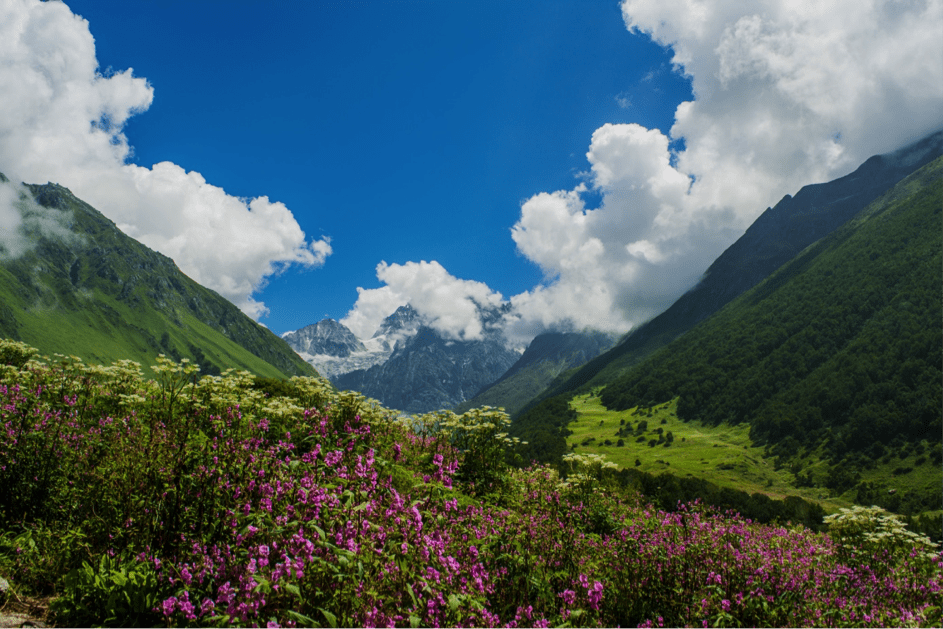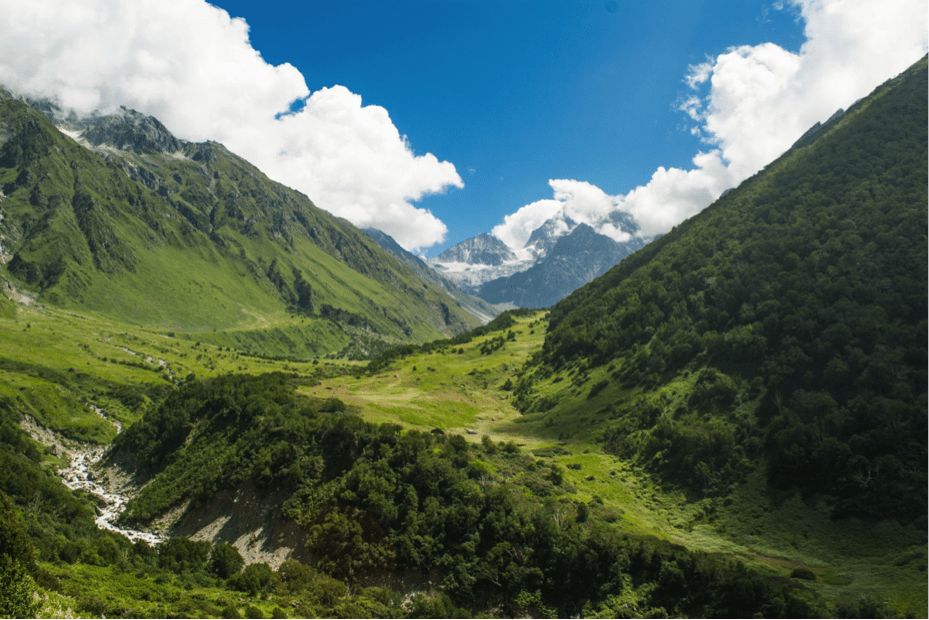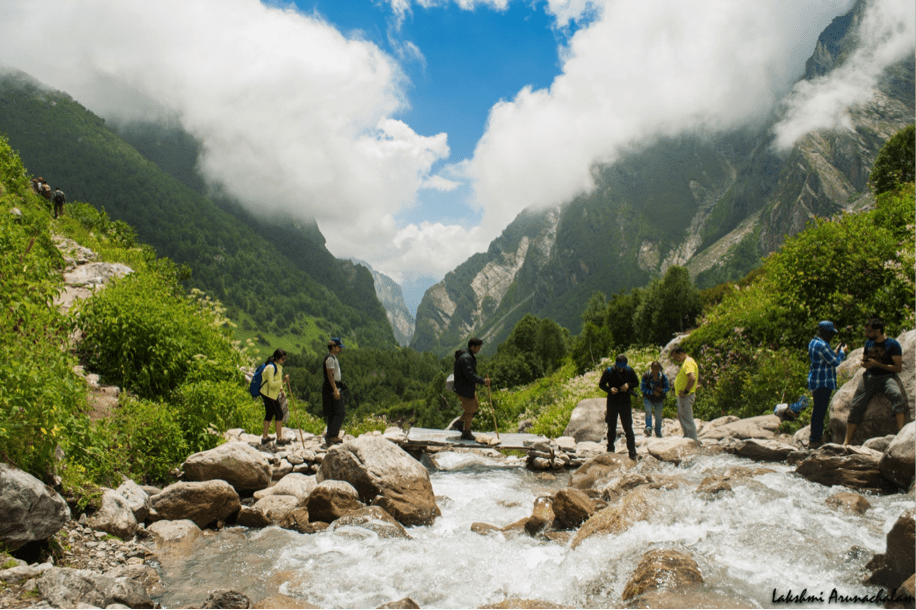Flowers as far as eyes can see, flowers as varied as it can be in size, color, and shape, gentle streams flowing down from mountains all around, most picturesque meadows, distant snow peaks contrasting the green mountains that look in front of us and an occasional mist that makes the whole landscape more beautiful – this Valley of Flowers (VoF) national park in Uttarakhand state is still one of the few pristine biospheres located in India.
It could more likely be attributed to the fact that until recently, the only way to reach was to trek. Things have changed now, and there are helicopter taxis transporting people to-and-fro. More on this in the “How to Reach Valley of Flowers” section. The valley houses many endemic birds and plants and is a haven for trekking enthusiasts. VoF trek is considered an easy to moderate one and one can opt it to get a taste of what a high altitude Himalayan trek would be like.
Let's quickly dive into the details:
Valley of Flowers Travel Guide
Now let’s look into the detailed travel guide of Valley of Flowers where I will talk about how you can reach it, where you can stay, what you can do, what to expect, what not to expect. In the end, I will share with you some of the commonly asked questions about Valley of Flowers trek too. So, without wasting further time, let’s go for an adventure 😛

Location & Altitude
Valley of Flowers is nestled in snowy peaks such as Gauri Parvat (Tipra Glacier begins here), Rataban, Kunt Khal, Saptsring, and Nilgiri Parvat. VoF is The park itself is part of the Nanda Devi Biosphere, which is a UNESCO World Heritage Site.
The streams that you see in the valley are rivulets that meet River Pushpavati, which originates from Tipra Glacier of Bhyunder of Garhwal Himalayas and joins Lakshman Ganga at Ghangaria. From Ghangaria, this river becomes Bhyunder, drains into Alaknanda at Govindghat around 12 km downstream. The valley runs along the banks of River Pushpavati.
How to Reach Valley of Flowers
When a place is raw and natural, it generally is a little difficult place to reach. One has to take multiple journeys, although it is possible to drive directly to Govindghat from Delhi (approx. 500 km) avoiding few of the steps.
- Delhi – Haridwar/Dehradun (By train/bus to Haridwar, flights also available to Dehradun)
- Haridwar/Dehradun – Joshimath (approx. 280 km, 10 hours by road. Public transport or hired taxi)
- Joshimath – Govindghat (20 km, 45 min by road. Public transport or hired taxi)
- Route A (Budget option) –
- Govindghat – Trek start place (4 km, either by walk or shared taxi/jeep)
- Trek start place – Ghangaria (Trek 11 km by foot, mule, porter)
- Ghangaria – VoF (Trek 5 km by foot, porter)
- Route B (Splurge option) –
- Govindghat to Ghangaria (By helicopter)
- Ghangaria to VoF (By foot, porter)
Trip Suggestion: If you love hiking and trekking, then you must also check out The Trek to Gaumukh – A Step by Step Guide.
Valley of Flowers Trek Details
- Govindghat (1920 m) to trek start place (2195 m) – gradual ascent on well-laid roads. One can walk or hire a shared taxi for 400 INR and save some precious energy.
- At the place where the trekking begins, there are lots of porters, mules available for hire. It is best to leave luggage at Govindghat and carry only essentials in a backpack for the trek. Even the backpack you can send on the mules to your hotel in Ghangaria. Then you can trek at peace carrying the only camera and water bottle (plenty of places to refill)
- Trek start place (2195 m) to Ghangaria (2926 m) – is an easy to moderate trek. It is a gradual ascent, and a well-laid path is available. Till half of this trail, River Lakshman Ganga is one side, and after a river crossing (via a bridge), we can no longer see the river. At certain places, it is a little steep; it is helpful if you carry a stick. This route has snacks shops (esp at a river crossing) where you can have your lunch and proceed further.
- Ghangaria (2926 m) to VoF (3505 m). We can further trek 2-3 km inside the valley to reach its further ends. Only 3 km of the valley is open to tourists and rest all are covered under the core area of the park.
- Ghangaria (2926 km) to Hemkund Sahib (4300 m) – Optionally, one can also visit Hemkund Sahib (a Sikh pilgrimage site), which has a Gurudwara and a glacial lake behind it surrounded by misty mountains. It is a difficult trek of about 6 km, but mules are available for hire in Ghangaria that you can use for Hemkund.
We have to get a permit from the forest department to enter the VoF. There is a ticket counter (150 INR for Indians, 600 INR for other nationals) at the entry where you can purchase the ticket. The ticket is valid for three days. It is better to reach the counter early or get the tickets on the day you reach Gangharia. Overnight camping is not allowed inside the valley, and all visitors need to exit by 5 pm.

Best Time to Visit Valley of Flowers
Every year a spectacular flowering bonanza begins in these high altitude alpine meadows. Though it is open around mid-June till Sep once the snow starts melting, the best time to visit to view the blooming flowers in July and Aug.
The valley is not accessible beyond December until early May. Each month different flowers bloom carpeting in the valley in various shades of flowers. It might rain on a day or two, but the sight of the valley makes all the discomfort fly away.
Do not forget to check out must-visit places in Uttarakhand to play in the snow or snowfall.
Suggested Itinerary for Valley of Flowers
- Day 1 – Reach Delhi. Overnight to Haridwar/Dehradun.
- Day 2 – Haridwar – Joshimath – Govindghat
- Day 3 – Govindghat – Trek start place – Ghangaria (Trek – 4 km + 11 km)
- Day 4 – Ghangaria – VoF – Ghangaria (Trek – 5 km + 5 km)
- Day 5 (Optional) – Ghangaria – Hemkund Sahib (Trek – 6 km + 6 km)
- Day 6 – Ghangaria – Govindghat (Trek – 11 km + 4 km)
- Day 7 (Optional) – Govindghat – Badrinath – Mana – Vasudhara Falls – Govindghat
- Day 8 – Govindghat – Joshimath – Hardiwar/Dehradun. Overnight train/bus to Delhi.
Recommended Read: You should also look at our Valley of Flowers & Hemkunt Sahib – Most Common Itinerary
Other sightseeing details near Valley of Flowers
- Govindghat – Badrinath is around 25 km and takes nearly an hour to reach. If weather permits, the majestic Neelkand peak can be seen from Badrinath temple. This temple is one of the abodes of Chardham yatra.
- Badrinath – Mana is 3 km, which can be covered by taxi. The trek from mana village to Vasudhara falls around 6 km, which is one of the beautiful trails one can come across. If you plan for this trek, make sure you start early in the morning. It is advisable to return by 1 pm or 2 pm to Mana village. There are no snacks, water available on this route; please carry sufficient supplies. It is a very scenic route and easy when compared to VoF or Hemkund Sahib.
- Panch Prayag – The five confluences of rivers in the Garhwal region of Himalayas. Vishnuprayag, Nandaprayag, Karnaprayag, Rudraprayag, and Devprayag, you can see on the way from Joshimath to Haridwar. The color of water varies according to the season and is usually muddy/grey during Jul-Aug due to the monsoon season.
- For the religiously oriented, a visit to Rishikesh and Ganga-Aarti at Haridwar in the evening, you can add to the itinerary.
- Joshimath is the gateway to several Himalayan treks, pilgrim sites. Auli can also be visited from here. The route to Kedarnath also begins here.
You should always carry your own water bottle and refill it as many times as you need water. It will not only keep you hydrated always, but you will also help in saving the Himalayas from plastic garbage. Remember, every tiny step counts and your step in this direction can help save the Himalayas too !! 🙂 🙂
Mobile connectivity
Mobile connection works (BSNL/Airtel) almost throughout except in Ghangaria/VoF and patches on the way from Haridwar to Govindghat. Mobile connectivity is not available in Mana or Vasudhara falls.
Accommodation Options at Valley of Flowers
- Govindghat – Hotel Bhagat run by Jaideep Bhai is a wonderful place with good views of the Lakshman Ganga river. The helicopter rides to the valley also begin from here only. Excellent food, good hospitality, and Jaideep himself an avid trekker. For more details, please check their website. Contact details for Jaideep: 9568263027 | 9412008918 | hotelbhagat.govindghat@yahoo.in | jaideep.bhandari@yahoo.in
- Ghangaria – the entire village is full of hotels and guesthouses. The hotels are very basic sometimes without hot water in taps, and it tends to get cold in the night.
- Haridwar – lots of options near the railway station, river. Unless it is a big group, I would suggest booking the room on-the-spot after checking it.
- Own Camping Gear – Of course, if you are one of those who loves camping, then well, you can carry your camps and stay up nearby river or nearby guest house. Nature is with you, just make sure to clean up the mess before you leave :).
Medical Facilities
While trekking, it is better to carry first-aid (if weight permits) as there are no medical facilities available. Gangharia village has one medical shop for emergencies (but it is better to buy important tables/medicines upfront from Haridwar).
Things to carry for Valley of Flowers Trek
- Normal sports shoes are enough to do this trek but ankle-high hiking shoes or trekking shoes with protection from the water will always help in protecting your ankles from twists or injuries and keeping the feet dry.
- Backpack to carry a change of clothes, water bottle
- Woolen clothes
- Stick for support (no need for buying poles, sticks are available for sale at INR 50)
- Gangharia to VoF needs packed lunch and/or snacks, energy bars
- Umbrella
- You should check out the Discover with Dheeraj 12 Must-Have Things to Carry on Hiking or Trekking Trips
Traveling Responsibly
- Please remember that many flowers/plants you see in VoF are endemic to that region. Keeping the place clean would ensure its sustainability.
- Do not litter inside the national park or en route. Be a responsible traveler. I hope you read the DoW tips on Responsible Travel in the Himalayas.
- Please carry water bottles from home and fill it up from pure water streams that flow everywhere. Let us not create more plastic waste in the already fragile environment!
- Please do not spray Volini or drain out food waste anywhere that could affect the flora.
- Avoid loud music while trekking. It could be uncomfortable for others.

FAQs
Conclusion
Valley of Flowers or VoF is a must-visit place since it checks many boxes for a traveler. It is a Himalayan destination and a natural phenomenon that occurs only for two months a year. Even moderately fit persons can do this trek in Garhwal. It doesn’t put a hole in our pockets (cost is less if we trek). The helicopter services make the job even easier, thereby making it accessible to anyone.
Have a travel question?? You can subscribe to my YouTube channel and leave a comment to ask your travel questions about traveling to the Himalayas.
It gives a taste of high altitude trek, yet the risks associated with it are minimal in terms of trek path (well-laid), availability of mules/porters, the presence of shops/hotels, etc. Why not give it a try next time you plan for “The Himalayas“?! 🙂 🙂
Do you still have any questions or suggestions or need any help in planning your trek to Valley of Flowers? If yes, please feel free to post them either in the comments section of this article below. You can also take guidance from many travel experts in our DwD Community Forums and discuss your upcoming travel plans for VoF and Valley of Flowers 🙂
If you like the article, please feel free to share it with any of your family or friends who are planning a trek to Valley of Flowers or VoF.
Now step out to experience the peacefulness and beauty of this amazing place in the Himalayas, and in the bargain, get fit too.





![Why avoid traveling on Manali Leh Highway in October for Ladakh trip? [5 Safety Reasons]](https://discoverwithdheeraj.com/yt_vid_thumbs/ladakh/104.png)
7 Comments
Comments section gets closed in 90 days. To ask your travel questions, you can follow my YouTube Channel for a faster reply or for a much slower reply follow me on Instagram. :)
Hi dheeraj g how r u.i want to ask u something that i want to go leh on 16 oct.2018.i have alredy dine shrinagar leh manali three to four times.but in july.but know we want to go in oct.i am asking u that plz tell me the road condition in this month.is there any problem we haveto face or not.is everthing will be ok in this monthmy trip is
Day 1 chd to patnitop
Day 2 srinagar
Day 3 srinagar to kargil
Day 4 kargil to leh
Day 5 leh local sights
Day 6 leh to nubra valley via k top
Day 7 local nubra hunder diskit
Day 8 nubra to pangong via shyok
Day 9 pangong to morrire via chushul
Day 10 morrire to sarchu
Day 11 sarchu to manali
Day 12 manali to chd
Now i want to ask that i want to go morrire via chushul .is the riad condition is good .is there any need of permits.but know this year i want to done this route definately.so plz tell me the full information .
I am with u from 2010 .when we will done srinagar leh manali first time i get whole information from you and ur site .
Thanks
Plz rply as soon as
Thanks again
Thank you Sidhu bhai for following DoW since so long… It feel really good to see such attachment. I will suggest that you add one more day at Hanle between Pangong tso and Tso Moriri. Hanle is not a place to be missed.
Your plan is good as you have experience. October now a day are good, not so desolated and snow does happen but mostly it is possible to do the trip as blocks are not prolonged.
You need the special stamp permit for Chusul route from DC office in Leh.
Thanks so much dheeraj bai .thanks a lot
I’m Planing to visit VOF in mid of august , I want to visit from my own car is it possible to visit it by INNOVA ? , i also want the contact details of hotels . (jaideep bhai )
Mani, It is completely possible in your own car. Regarding Jaideep contact, let me get back to you if I can get it.
You can check out their website hotelbhagat.com/bhagat/accommodation/index.html for details. Here is the contact number & email id. Hope you have a great trip to VoF!
9568263027 | 9412008918
hotelbhagat.govindghat@yahoo.in
jaideep.bhandari@yahoo.in
Thanks Lakshmi for sharing it, I have updated them in your article too